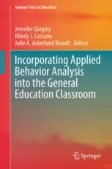Search
Search Results
-
What’s in a name: The role of verbalization in reinforcement learning
Abstract (e.g., characters or fractals) and concrete stimuli (e.g., pictures of everyday objects) are used interchangeably in the...

-
Manipulating reinforcement probability changes the temporal overestimation of anticipated aversive stimuli
The interval timing can be distorted by emotions. Previous studies indicated that anticipated fear stimuli can lead to temporal overestimation,...

-
Test–retest reliability of reinforcement learning parameters
It has recently been suggested that parameter estimates of computational models can be used to understand individual differences at the process...

-
Disequilibrium as Determinant of Reinforcement and Punishment Effects: A Replication
Response disequilibrium theory, an extension of the response deprivation hypothesis, proposes that behavior-change is due to disruptions in an...

-
Using Reinforcement to Prevent Challenging Behaviors
Challenging behavior is comprised of behaviors that interfere with an individual’s access to educational and social opportunities. Researchers have...
-
Using Equivalence-Based Instruction to Teach Schedules of Reinforcement to Staff Members
The present study evaluated the use of computerized equivalence-based instruction (EBI) to teach classes representing schedules of reinforcement to...

-
The reinforcement sensitivity theory affects questionnaire (RST-AQ). A validation study of a new scale targeting affects related to anxiety, approach motivation and fear
This paper presents the RST-AQ, a 22-item scale to measure the affective states related to the three motivational systems postulated by Reinforcement...
-
1-Back reinforcement symbolic-matching by humans: How do they learn it?
For humans, a distinction has been made between implicit and explicit learning. Implicit learning is thought to involve automatic processes of the...

-
Effects of Commission and Omission Errors on the Efficacy of Noncontingent Reinforcement
Noncontingent reinforcement (NCR) is an effective behavioral intervention when implemented consistently. NCR may be particularly well-suited for use...

-
Building an intelligent recommendation system for personalized test scheduling in computerized assessments: A reinforcement learning approach
The introduction of computerized formative assessments in the classroom has opened a new area of effective progress monitoring with more accessible...

-
Using Positive Reinforcement to Increase the Physical Activity of Individuals with Developmental Disabilities: A Review
Physical activity has many benefits, but many individuals with developmental disabilities fail to exercise regularly. Procedures in which...

-
Hunger improves reinforcement-driven but not planned action
Human decisions can be reflexive or planned, being governed respectively by model-free and model-based learning systems. These two systems might...

-
Reinforcement Learning Under Uncertainty: Expected Versus Unexpected Uncertainty and State Versus Reward Uncertainty
Two prominent types of uncertainty that have been studied extensively are expected and unexpected uncertainty. Studies suggest that humans are...

-
Improving Beverage Choice in Adults with Developmental Disabilities: Implementation of a Token Reinforcement System in a Community Residential Setting
Individuals with developmental disabilities (DD) are twice as likely to have obesity than non-disabled individuals. Replacing the consumption of...

-
Partial reinforcement effects on acquisition and extinction of a conditioned taste aversion
Four experiments with rat subjects asked whether a partial reinforcement extinction effect (PREE) occurs in taste aversion learning. The question has...

-
The Effects of Signaled Delays on the Effectiveness of Differential Reinforcement of Other Behavior (DRO) Reinforcement Systems
Differential reinforcement of other behavior (DRO) is a commonly used reinforcement-based system for reducing problem behavior. DRO systems are...

-
Examinations of Biases by Model Misspecification and Parameter Reliability of Reinforcement Learning Models
Reinforcement learning models have the potential to clarify meaningful individual differences in the decision-making process. This study focused on...

-
Response Cost and Time-Out from Reinforcement
Response cost and time-out are behavior change tactics that have been applied widely as part of intervention efforts to reduce problematic behaviors...
-
Personalized System of Instruction
Personalized System of Instruction (PSI) is an instructional approach based on gradual learning, consistent feedback, and immediate reinforcement....
-
The Role of Reinforcement in the Treatment of Sleep Problems
A fundamental principle of operant theory is that behavior is strengthened or weakened by environmental contingencies (i.e., operant behavior is...
